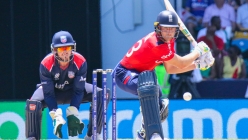Perhaps the clock should be stopped in cricket as well
2009 Jul 13 by Suresh Menon
Some sixty years ago, when Indian batsmen were moving towards their first-ever Test win and that against a powerful West Indies side, spectators were treated to the sight of the wicket keeper chasing the ball to the boundary. Clyde Walcott, the man with the pads later justified it in his book, saying that with the field spread out, he was the nearest to the boundary line behind him. In the end, with India needing six runs to win from seven balls, the Test ended because the umpire first counted wrong and then forgot about the last over altogether. The match was drawn.
The West Indies reaction was summed up by Gerry Gomez who told a journalist, “You don't carry on and get clobbered just because you think it is sporting. You are playing Test cricket. It is a serious thing.”
In later years, time-wasting especially in the last session of a close match was sought to be brought under control with the introduction of the mandatory overs. Twenty six-ball overs had to be bowled no matter what. But what if the fielding team was rushing through their overs and looked like they might get in a couple more?
This is what happened at Cardiff, with England’s last pair at the crease. Time had to be wasted. And in the time-honored tradition, out came the 12th man with the gloves, the physio with his tubes and sprays, and since it was the home team that was benefiting there were few boos and catcalls from the crowd. In a Test in Australia recently, the Indian number eleven walked out to bat with two left gloves in an attempt to waste time. It was so puerile, spectators didn’t know whether to laugh or boo.
Ricky Ponting’s reaction was along expected lines. “He changed the gloves the over before and I don’t think they’d be too sweaty in one over,” he said. “I’m not sure what the physio was doing out there. I didn’t see anyone call for the physio to come out. As far as I’m concerned, it was pretty ordinary. We came to play by the rules and the spirit of the game. It’s up to them to do what they want to do.”
Teammate Nathan Hauritz, however, felt that he would have done exactly the same thing in the same situation.
Next to ‘walking’ (or not), time-wasting is one of the game’s unlegislated events. Non-walkers say that in the long run, the decisions even out. But contexts change. Time-wasting is usually a team effort, with the fielding captain under pressure consulting his bowler, complaining to the umpire about the shape of the ball, rearranging the field and indulging in a series of actions that have an obvious intent. Umpires often react with a “C’mon, get on with it,” but little more. Batsmen asking for gloves and sprays seldom get even that suggestion thrown at them.
In other sports – soccer or basketball, for instance – the clock is stopped when there is a break in play. Time is added on at the end of the game so no team suffers from its opponent’s time-wasting tactics. In soccer, players who pretend to be injured or fake falls in the opponents’ box are given yellow or red cards for bringing the game into disrepute. Cricket likes to maintain its ethos, and it is unlikely that a batsman who plays on after knowing he is out will be penalized in any way.
But time-wasting is another matter. Perhaps the clock should be stopped while muscles are attended to or gloves are exchanged.




